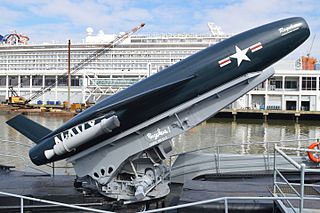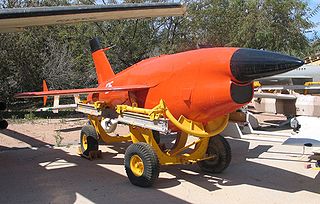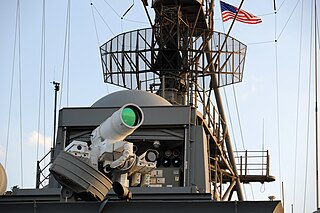The Lockheed Martin Corporation is an American defense and aerospace manufacturer with worldwide interests. It was formed by the merger of Lockheed Corporation with Martin Marietta in March 1995. It is headquartered in North Bethesda, Maryland. As of January 2022, Lockheed Martin employs approximately 115,000 employees worldwide, including about 60,000 engineers and scientists. Reports from 2024 estimate that Lockheed Martin Corporation (LMT) holds a market cap of around $139.7 billion.

The SSM-N-8A Regulus or the Regulus I was a United States Navy-developed ship-and-submarine-launched, nuclear-capable turbojet-powered second generation cruise missile, deployed from 1955 to 1964. Its development was an outgrowth of U.S. Navy tests conducted with the German V-1 missile at Naval Air Station Point Mugu in California. Its barrel-shaped fuselage resembled that of numerous fighter aircraft designs of the era, but without a cockpit. Test articles of the Regulus were equipped with landing gear and could take off and land like an airplane. When the missiles were deployed they were launched from a rail launcher, and equipped with a pair of Aerojet JATO bottles on the aft end of the fuselage.

The RIM-162 Evolved SeaSparrow Missile (ESSM) is a development of the RIM-7 Sea Sparrow missile used to protect ships from attacking missiles and aircraft. ESSM is designed to counter supersonic maneuvering anti-ship missiles. ESSM also has the ability to be "quad-packed" in the Mark 41 Vertical Launch System, allowing up to four ESSMs to be carried in a single cell.

The Crotale is a French, all-weather, short-range surface-to-air missile system developed to intercept airborne ranged weapons and aircraft, from cruise or anti-ship missiles to helicopters, UAVs or low-flying high-performance fighter aircraft. It was developed by Thomson CSF Matra and consists of a mobile land-based variant as well as various naval ones.

The BQM-74 Chukar is a series of aerial target drones produced by Northrop. The Chukar has gone through three major revisions, including the initial MQM-74A Chukar I, the MQM-74C Chukar II, and the BQM-74C Chukar III. They are recoverable, remote controlled, subsonic aerial target, capable of speeds up to Mach 0.86 and altitudes from 30,000 to 40,000 ft.

USNS Alan Shepard (T-AKE-3) is a Lewis and Clark-class dry cargo ship in the United States Navy. She is named after the astronaut and Rear Admiral, Alan Shepard (1923–1998), the first American in space and the fifth person to walk on the Moon.

A target drone is an unmanned aerial vehicle, generally remote controlled, usually used in the training of anti-aircraft crews.

The Ryan Firebee is a series of target drones developed by the Ryan Aeronautical Company beginning in 1951. It was one of the first jet-propelled drones, and remains one of the most widely used target drones ever built.

The Saudi Arabian Air Defense Forces or officially Royal Saudi Air Defense Forces (RSADF) is the aerial defense service branch of the Saudi Arabian Armed Forces (SAAF). It is fourth of the five service branches of the MOD. It has its HQ in Riyadh, where there is also an elaborate underground command facility that co-ordinates the kingdom's advanced "Peace Shield" radar and air defense system, with an estimated 40,000 active duty military personnel in 2015. Along with the Royal Saudi Air Force (RSAF), it has the responsibility for securing the skies of Saudi Arabia.

The RIM-174 Standard Extended Range Active Missile (ERAM), or Standard Missile 6 (SM-6), is a missile in current production for the United States Navy (USN). It was designed for extended-range anti-air warfare (ER-AAW) purposes, providing capability against fixed and rotary-wing aircraft, unmanned aerial vehicles, anti-ship cruise missiles in flight, both over sea and land, and terminal ballistic missile defense. It can also be used as a high-speed anti-ship missile. The missile uses the airframe of the earlier SM-2ER Block IV (RIM-156A) missile, adding the active radar homing seeker from the AIM-120C AMRAAM in place of the semi‑active seeker of the previous design. This will improve the capability of the Standard missile against highly agile targets and targets beyond the effective range of the launching vessels' target illumination radars. Initial operating capability was planned for 2013 and was achieved on 27 November 2013. The SM-6 is not meant to replace the SM-2 series of missiles but will serve alongside and provide extended range and increased firepower. It was approved for export in January 2017. An air-to-air variant of the SM-6, known as the AIM-174, is the first dedicated long-range air-to-air missile employed by the USN since the 2004 retirement of the AIM-54 Phoenix. SM-6 can also be fired from the U.S. Army's Typhon missile launcher as part of the Strategic Mid-range Fires System (SMRF).

The MA-31 was a conversion of the Kh-31, an anti-ship missile developed by the Soviet Union during the 1980s, for use as a target drone by the United States Navy. Although the missile proved successful in this role, political complications resulted in the type being only an interim solution, and only a small number of the missiles were acquired.
Kratos Defense & Security Solutions, Inc, headquartered in San Diego, California, is an American technology company with manufacturing concentrations in weapons and military electronics. Customers include the U.S. federal government, foreign governments, commercial enterprises and state and local government agencies. The company is divided into 6 divisions.

The AQM-127 Supersonic Low-Altitude Target (SLAT) was a target drone developed during the 1980s by Martin Marietta for use by the United States Navy. Derived from Martin Marietta's work on the cancelled ASALM missile, SLAT proved to have severe difficulties in flight testing, and the project was cancelled during 1991.

The AN/SEQ-3 Laser Weapon System or XN-1 LaWS is a laser weapon developed by the United States Navy. The weapon was installed on USS Ponce for field testing in 2014. In December 2014, the United States Navy reported that the LaWS system worked perfectly against low-end asymmetric threats, and that the commander of Ponce was authorized to use the system as a defensive weapon. Due to various operational problems, LaWS was never put into mass production; it was replaced by the High Energy Laser with Integrated Optical-dazzler and Surveillance.

The Composite Engineering BQM-167 Skeeter is a subscale aerial target (drone) developed and manufactured by Composite Engineering Inc. and operated by the United States Air Force and certain international customer air forces. It replaced the Beechcraft MQM-107 Streaker.

The Kratos XQ-58 Valkyrie is an experimental stealth unmanned combat aerial vehicle (UCAV) designed and built by Kratos Defense & Security Solutions for the United States Air Force's Low Cost Attritable Strike Demonstrator (LCASD) program, under the USAF Research Laboratory's Low Cost Attritable Aircraft Technology (LCAAT) project portfolio. It was initially designated the XQ-222. The Valkyrie completed its first flight on 5 March 2019 at Yuma Proving Ground, Arizona.

On 14 September 2019, drones were used to attack oil processing facilities at Abqaiq and Khurais (خريص) in eastern Saudi Arabia. The facilities were operated by Saudi Aramco, the country's state-owned oil company. The Houthi movement in Yemen claimed responsibility, tying it to events surrounding the Saudi intervention in the Yemeni Civil War and stating they used ten drones in the attack launched from Yemen, south of the facilities. Saudi Arabian officials said that many more drones and cruise missiles were used for the attack and originated from the north and east, and that they were of Iranian manufacture. The United States and Saudi Arabia have stated that Iran was behind the attack while France, Germany, and the United Kingdom jointly stated Iran bears responsibility for it. Iran has denied any involvement. The situation exacerbated the 2019 Persian Gulf crisis.
Shield AI is an American aerospace and arms technology company based in San Diego, California. It develops artificial intelligence-powered fighter pilots, drones, and technology for military operations. Its clients include the United States Special Operations Command, US Air Force, US Marine Corps, US Navy and several international militaries.
The Kratos MQM-178 Firejet is a subsonic aerial target drone for use in training against surface-to-air and air-to-air missiles. It was developed by Kratos Defense & Security Solutions, and is currently in service with several operators worldwide.

The Beechcraft BQM-126A, also known by the company designation Model 997, is a subsonic aerial target drone developed by Beechcraft for use by the United States Navy. No production of the type was undertaken.
















